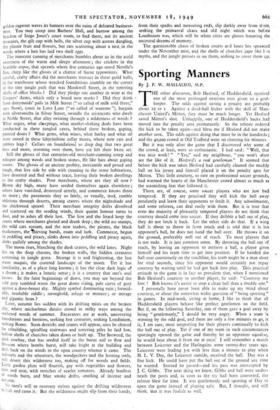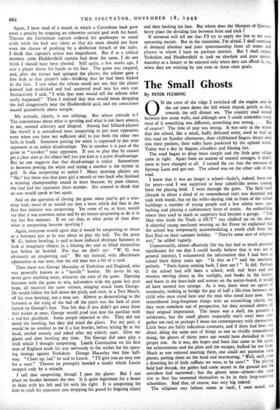Sporting Manners
B‘ j. P. W. MALLALIEU, M.P.
HE other afternoon, Bob Hesford, of Huddersfield, received one of the most prolonged ovations ever given to a goal- keeper. The odds against saving a penalty are probably about so to s. Against a dead-ball kicker with the skill of Man- chester United's Mitten, they must be much longer. Yet Hesford saved Mitten's shot. Unhappily, one of Huddersfield's backs had moved into the penalty area prematurely. So the referee ordered the kick to be taken again—and bless me if Hesford did not make another save. The odds against doing that must be in the hundreds and the 4o,000 crowd at Old Trafford went on cheering for minutes.
But it was only after the game that I discovered why some of the crowd, at least, were so enthusiastic. I had said: " Well, that was nice work! " " Yes," said my neighbour, " you won't often see the like of it. Hesford's a real gentleman." It seemed that before the kick was taken Hesford had carefully cleaned the muddy ball on his jersey and himself placed it on the penalty spot for Mitten. This little courtesy, so rare on professional soccer grounds, had warmed the hearts of the Manchester crowd almost as much as the astonishing feat that followed it.
There are, of course, some soccer players who are just bad tempered. If they are penalised they will kick the ball away petulantly and leave their opponents to fetch it. Any schoolmaster, and some referees, can deal easily with them. But it is true that even the majority of pleasantly tempered players do not think that courtesy should come into soccer. If they dribble a ball out of play, they do not fetch it back. Let the other side do that. If a wing half is about to throw in from touch and is told that it is his opponent's ball, he does not hand the ball over. He throws it on the ground, preferably well out of reach. To most players that is not rude. It is just common sense. By throwing the ball out of reach, by leaving an opponent to retrieve a ball, a player gives himself and his team time to get into position. If he handed the ball over courteously on the touchline, his team might be a man short for vital seconds, since his opponent would certainly not repay courtesy by waiting until he had got back into play. This practical attitude to the game is in fact so prevalent that, when I mentioned Bob Hesford's courtesy to another player, he said : "Courtesy my foot ! Bob knows it's easier to stop a clean ball than a muddy one."
I personally have never been able to make up my mind about courtesy, or about the somewhat wider question of "being sporting" in games. In mid-week, sitting at home, I like to think that all Huddersfield players behave like perfect gentlemen on the field. But if, on the following Saturday, one of them gave a goal away by being " gentlemanly," I should be very angry. When a team is winning by the odd goal, and there are only a few minutes to go, it is, I am sure, most unsporting for their players continually to kick the ball out of play. Yet if one of my team in such circumstances sportingly opened the game and thereby let an opponent equalise, he would hear about it from me at once: I still remember a match between Leicester and the Harlequins some twenty-five years ago. Leicester were leading 3-0 with less than a minute to play when H. L. V. Day, the Leicester outside, received the ball. Day was a fine kick. He could have put the ball out of the ground any time he wanted. Instead he passed—and his pass was intercepted by J. C. Gibbs. The next thing we knew, Gibbs and ball were under- neath the posts and, as soon as the try had been converted, the referee blew for time. It was gentlemanly and sporting of Day ro open the game instead of playing safe. But, I thought, and still think that it was foolish as well.
Again, I have read of a match in which a Corinthian back gave away a penalty by stopping an otherwise certain goal with his hand. Thereat the Corinthian captain ordered his goalkeeper to stand aside while the kick was taken so that his team should not have even the chance of profiting by a deliberate breach of the rules. I think that captain's action was magnificent. But if at a critical moment sonic Huddersfield captain had done the same, I do not think I should have been pleased. Still again, a few weeks ago, I saw a player throw his hands to his face. The game was stopped, and, after the trainer had sponged the player, the referee gave a free kick to that player's side—thinking that he had been kicked in the face. I saw what the referee could not see, that the player himself had miskicked and had spattered mud into his own eye. Instinctively I said, " I wish that man would tell the referee what really happened." Then I realised that that would mean dropping the ball dangerously near the Huddersfield goal, and my conscience soared qualmlessly above scruple.
My attitude, clearly, is not edifying. But whose attitude is The conventions about what is sporting and what is not have always, to me, seemed arbitrary and illogical. Among bad billiard-players like myself it is considered most unsporting to pot your opponent, even when you have not sufficient skill to put both the other two balls in baulk. Somehow potting the white is supposed to put your opponent at an unfair disadvantage. Yet in snooker it is part of the game to " snooker " your opponent. If you so play that he cannot get a clear shot at the object ball you put him at a grave disadvantage. But no one suggests that that disadvantage is unfair. Somewhere in between potting the white and laying a snooker is the stymie in golf. Is that unsporting or unfair ? Many sporting players say "No," but there was that poor girl a month or two back who finished a winning championship round in tears because, by pure chance, she had laid her opponent three stymies. She seemed to think that no one would speak to her again.
And on the question of closing the game when you've got a win- ning lead—most of us would say that a team which did that in the first five minutes was unsporting. Yet some of us, at least, would say that it was common sense and by no means unsporting to do it in the last five minutes. If we say that, at what point of time does what is unsporting become sporting ?
Again, everyone would agree that it would be unsporting to shout at a batsman just as he was about to play the ball. Yet the great W. G., before bowling, is said to have induced obstinate batsmen to look at imaginary objects in a blazing sky and so blind themselves just before he bowled. For that we don't say: " W. G. was obviously an unsporting cad." We say instead, with affectionate admiration in our tone, that the old man was a bit of a card.
Then there was George Macaulay of Yorkshire and England, who was generally known as a " hostile " bowler. He never let up, never gave anything away, whatever the state of the game. Opening batsmen with the game to win, tail-enders with the game lost past hope, all received the same vicious, stinging attack from George. He would follow the ball down the pitch, and once, in a Test Match, off his own bowling, ran a man out. Almost as demoralising to the batsmen as the sting of the ball off the pitch was the look of utter hatred on George's face. You felt that if you didn't get away from that wicket at once, George would prod you into the pavilion with a red-hot pitchfork. Some people objected to this. They did not mind the bowling, but they did mind the glares. For my part, it would be no comfort to me if a fast bowler, before letting fly at my head, smiled sweetly and asked after my elderly aunt. Give me glares and slow bowling any time. Yet George did once play a trick which I thought unsporting. Learie Constantine on his first tour of England made his way nervously to the wicket for his open- ing innings against Yorkshire. George Macaulay met him half- way. "Cheer up, lad," he said to Learie. " I'll give you an easy one for a start." Thereat he promptly bowled a sizzler which Learie stopped only by a miracle.
I call that unsporting, though I pass the glares. But I can place no border between the two. It is quite legitimate for a boxer to feint with his left and hit with his right. It is unsporting for him to trick his opponent into dropping his guard by feigning injury
VEMBER 1 $, .1 949
and then bashing his face. But where does the Marquis of Queens- berry place the dividing line between feint and trick ?
If someone will tell me that I'll try to apply the line to my own spectating morals. But in the meantime, I'm afraid, I shall continue to demand absolute and pure sportsmanship from all teams and players in whom I have no partisan interest. But I shall expect Yorkshire and Huddersfield to look on absolute and pure sports. manship as a luxury to be enjoyed only when they can afford it, i.e., when they arc winning by zoo runs or three clear goals.















































































 Previous page
Previous page